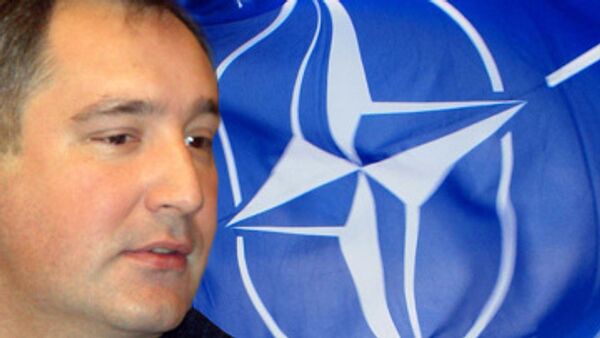Russia's envoy to NATO has said a new resolution to be considered by the Russia-NATO Council on assessing joint threats to the Euro-Atlantic space could prove to be a breakthrough.
The Russia-NATO Council held an extraordinary meeting at the level of ambassadors ahead of Friday's foreign ministerial meeting. The discussions focused on three documents likely to be submitted for signing Friday.
"We now have the text of a draft resolution for Russia-NATO Council foreign ministers on this issue [joint threat assessment], which sets out the beginnings of such work. If this works out, it will be a breakthrough decision," Dmitry Rogozin said at a Moscow-Brussels video press conference organized by RIA Novosti on Thursday.
The upcoming session, the first official talks to be held between Russia and NATO since the August 2008 Russia-Georgia war, is aimed at drafting a "roadmap" for improving relations between Moscow and the Western military alliance, which have also been strained by Russia's resistance to Georgia and Ukraine's bids to join NATO.
The first of the three documents is a review of common threats facing Russia and NATO. The ministers are expected to instruct their representatives to analyze Euro-Atlantic threats and agree on joint steps to counter them.
Rogozin said NATO Secretary General Anders Fogh Rasmussen believes that in a year's time Russia and the West will conclude that they don't pose threats to each other, and take a united stand.
On Tuesday, Rogozin said Canada had blocked the adoption of all documents to be considered at the upcoming meeting, adding there are factions in NATO that still regard Russia as a "Cold War" rival and oppose any "reset" of relations.
During an informal ministerial meeting in Greece in June, Russia and NATO agreed to renew cooperation on security issues, which was frozen after Russia and Georgia fought a five-day war in August 2008 over the former Georgian republic of South Ossetia, after which Russia recognized the independence of South Ossetia and Abkhazia, another former Georgian republic.
Russian President Dmitry Medvedev said in October that "Russia is ready to harmonize relations with the United States and other Western partners, including constructive cooperation with NATO in solving common tasks."
Rogozin also said Russia is unhappy with NATO's "full-format" cooperation with Georgia, as Russian analysis has shown that Georgia has undergone a full rearmament since last August's conflict over South Ossetia.
"[Georgian President Mikheil] Saakashvili has restored his country's military potential, but has not abandoned plans for a military resolution of the situation with South Ossetia and Abkhazia. Russia's political leadership and Defense Ministry are concerned over this," he said.
"On the one hand, we are cooperating with NATO on Afghanistan, and on the other, we toughly counter any policy to militarize Georgia and condone the Saakashvili regime," Rogozin said.
He also said deeper interaction between Russia and NATO is required to fight the drug threat from Afghanistan, and that representatives from the Russian Federal Security Service (FSB) and the drug enforcement agency could be added to Russia's mission to NATO.
Rogozin said a new unit to deal with information exchange on Afghanistan has been set up within the Russia-NATO Council.
He said Moscow backs Washington's new approach to Afghanistan, aimed at strengthening the country's state institutions and a consequent withdrawal of U.S. troops.
U.S. President Barack Obama said in a televised address to the nation on Tuesday that the U.S. would send an additional 30,000 troops to Afghanistan in the first part of 2010 to successfully end the war against the Taliban and establish peace in the country.
The NATO-led International Security Assistance Force (ISAF) and a separate U.S.-led coalition, involved in Operation Enduring Freedom, have a total of 112,000 troops in Afghanistan. The U.S. has some 68,000 soldiers in the country, and their number will increase to 98,000 when the new troops are deployed.
MOSCOW, December 3 (RIA Novosti)




